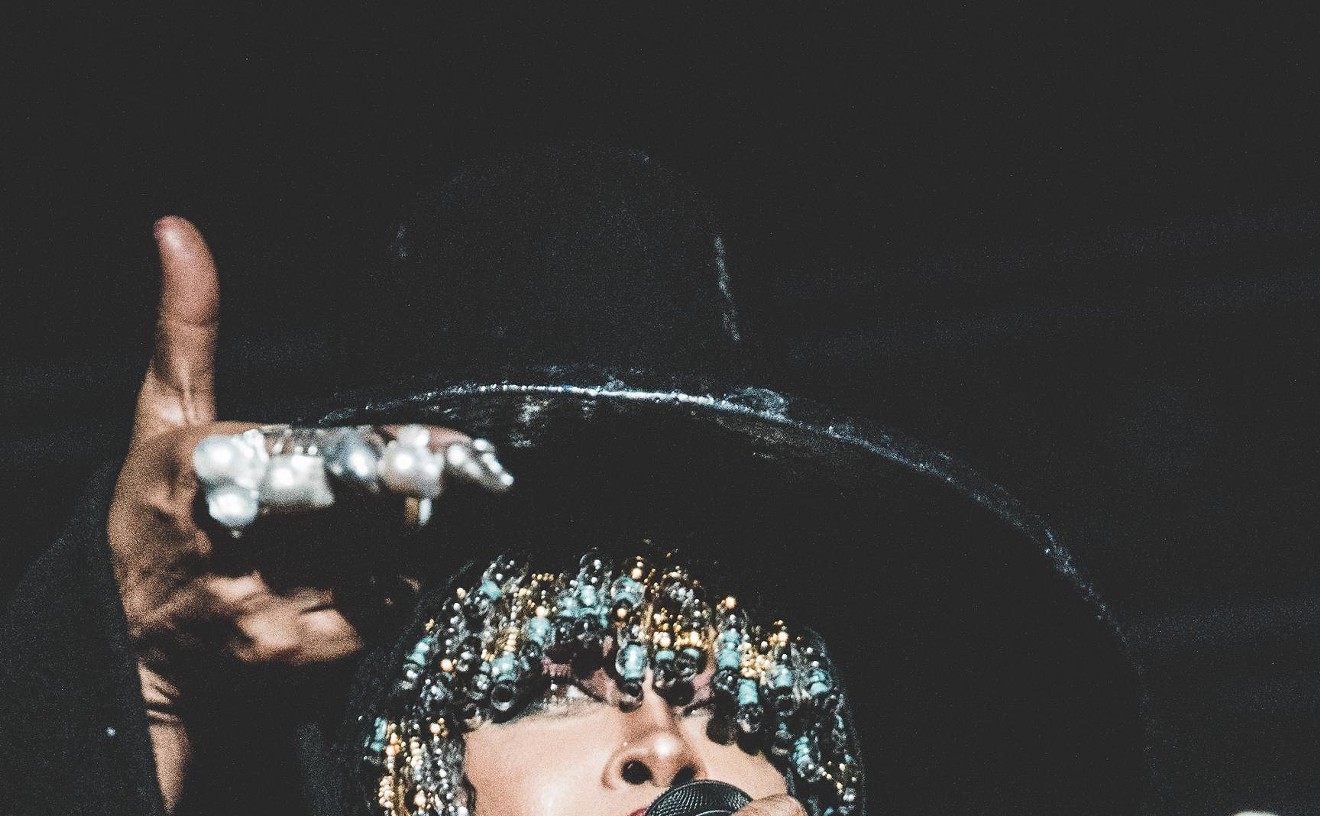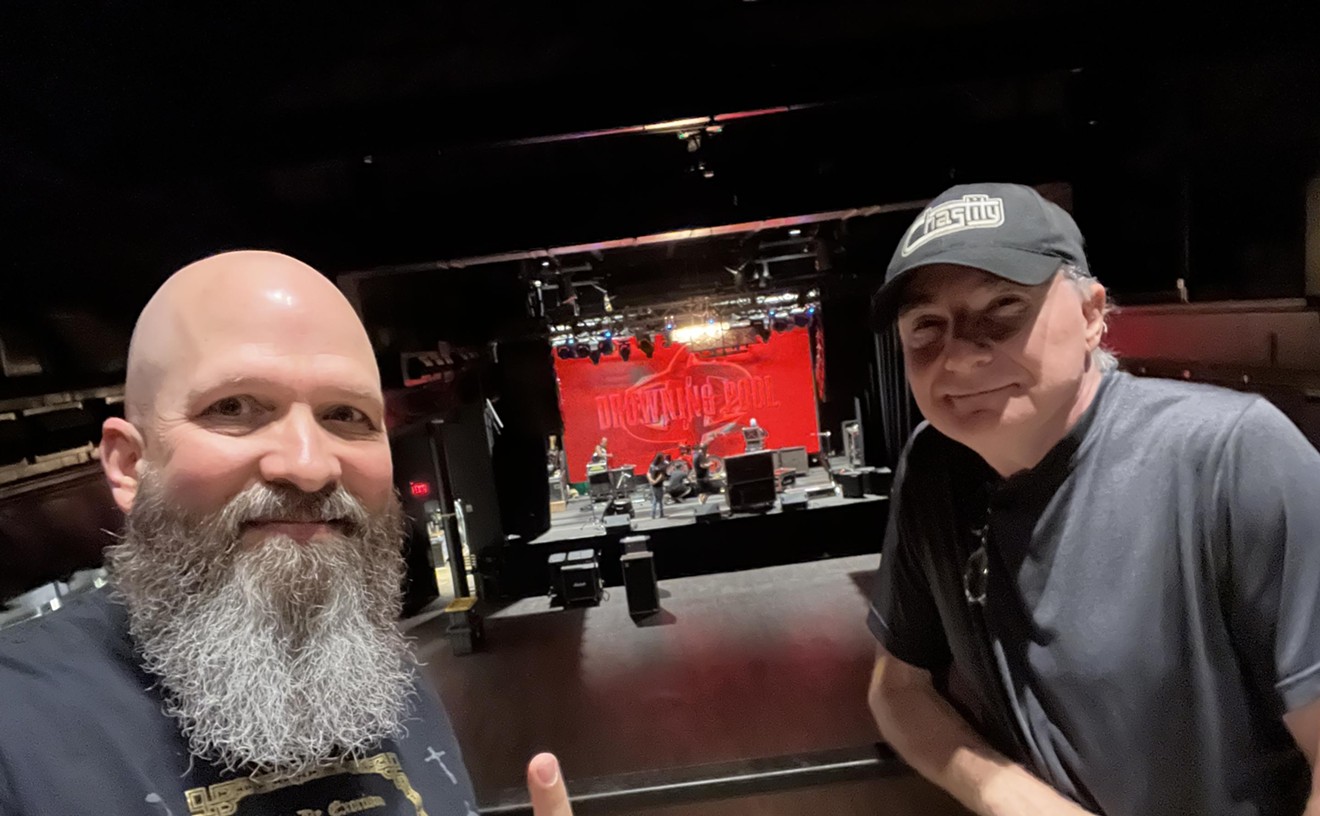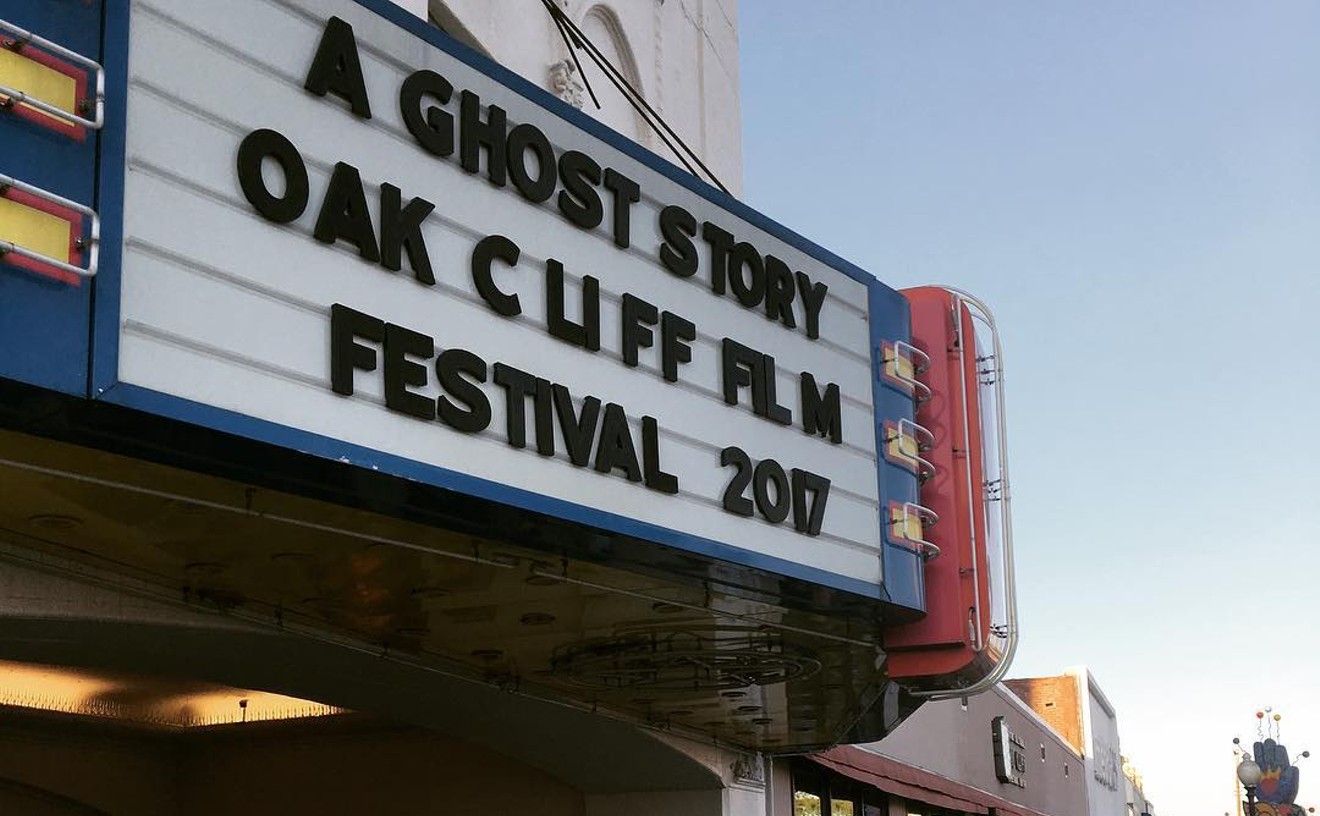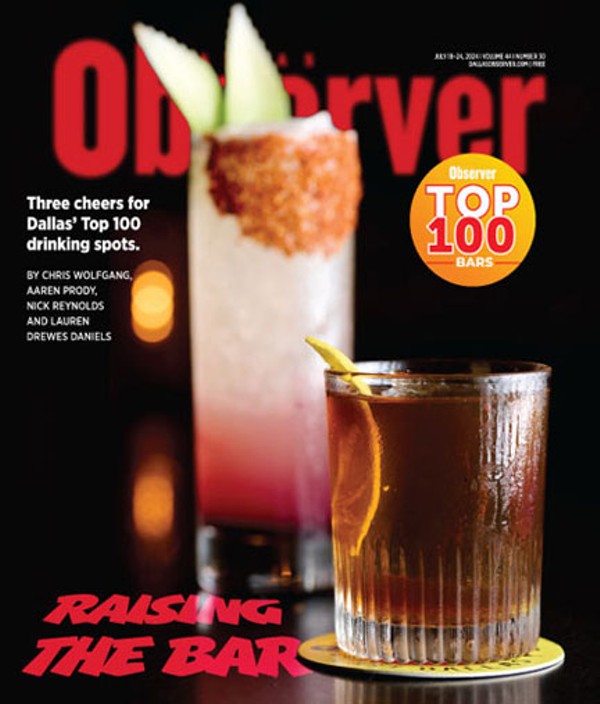Perhaps that moment seems so far away because the record business no longer fosters artists, no longer celebrates its geniuses, no longer cares about craft. Nowadays, it is a multibillion-dollar business somehow on the verge of collapse, with multinationals swallowing labels like Moby Dick on a rampage. In Los Angeles, the panic is almost palpable as label employees worry about car payments, rent, tomorrow's groceries; whispers of layoffs soon enough become screams, while millionaires and their accountants wielding axes walk through hallways looking for the next dozen servants to fire. And if you don't think this affects you, faithful music fan, guess again: Your favorite band may well be without a home tomorrow, forced to walk the streets in hopes that there's some other schmuck out there willing to give them money to make a little music.
Maybe those artists will wind up at the stoop of Lenny Waronker, one of the co-heads at DreamWorks Records. For 30 years, Waronker went to work each day at Warner Bros. Records and became rich believing there was no such thing as a hit record, only a good record--and hot damn if ever the twain shall meet. Waronker began as a junior A&R exec at the label in 1966 and eventually became its president, signing and/or producing no less than a roster that includes Randy Newman, Rickie Lee Jones, Elvis Costello, R.E.M., James Taylor, Ry Cooder, Gordon Lightfoot, and Eric Clapton. To name but a very few. His name is not familiar to record buyers who don't read the fine print, but that is only because he has stood out of the way, in the shadows--over an artist's shoulder, but never in front of the microphone. As such, he has become something of a mythic figure in the industry--the rare record-label boss spoken of with reverence instead of mistrust or disdain.
"It's always about the artist's work," he says even now, sitting in a plush suite at the Mansion on Turtle Creek. "Always. And especially at Warner Bros. You know, ultimately there was this thing about making a Warner Bros. record. There was this kind of record we made--eclectic records, records that went all over the place. There was this sort of unspoken sphere that existed in the late '60s, early '70s. It was really a form of rebellion. It became so indulgent. Being a part of that was just a fantastic thing. You go in the studio, and the idea was not about the hit. The idea was how do you scare the shit out of them or turn on your peers. How do you get Brian Wilson to pay attention? The hit was too far-fetched, too hard. The easier, more fun, challenging part was, 'Let's do something that's real, that really is meaningful.'"
Yet despite his success at Warners, Waronker up and left his longtime home in 1995, following out the door his old friend and mentor Mo Ostin, the man who was instrumental behind the signings of Jimi Hendrix, Paul Simon, Madonna, and Green Day, among so many others. Waronker, Ostin, and Mo's son Michael left when Time Warner, the label's parent company, decided they wanted to run the show. Paradise was being overrun by the savages. It was time for them to go.
In October of that year, the three resurfaced as the co-heads of DreamWorks Records, the label formed by Steven Spielberg, David Geffen, and former Disney boss Jeffrey Katzenberg as the music arm of their multimedia monster, which also includes a movie studio and a television production company. They claimed that DreamWorks Records would be a label "that was about quality," Waronker said at the time, "not totally profit-driven." In other words, it would be to the 1990s what their beloved Warner Bros. Records was to the 1960 and '70s. Three years later, Waronker and the Ostins have made good on their word. For better or worse.
DreamWorks has had only two albums go platinum: George Michael's vilified 1996 album Older and the original cast recording of the inexplicable Broadway hit Rent. The only other record to sell more than 500,000 copies is Chris Rock's rant Bring the Pain. No, sir--this is not a label driven by profit at all. And if it is, well, there's gonna be some trouble. Ask Randy Travis, a onetime country superstar whose 1998 DreamWorks debut You & You Alone hasn't sold enough to justify the label's first foray into country--perhaps because the record's about as stiff as Randy's starched Wranglers. (Same goes for the just-released debut by Trisha Yearwood clone Linda Davis, whose "brand-new" I'm Yours features seven previously released songs and one from the The Prince of Egypt Nashville album, one of three soundtracks DreamWorks has released in conjunction with the animated film about Moses.)
DreamWorks' roster is still comparatively small, featuring only 16 artists, who range from the pedestrian (Travis, Henry Rollins, Subcircus) to the pandering (George Michael) to the wack (Dr. Octagon). Yet at the same time, DreamWorks has released four of this year's finest albums: the Propellerheads' don't-stop-till-ya-drop techno-pop gem Decksandrumsandrockandroll; Elliott Smith's wistful XO; Rufus Wainwright's from-the-art self-titled debut; and the eels' suicide-is-painless masterpiece Electro-Shock Blues.
None has sold particularly well--not a single one is in the Billboard Top 100. (The only DreamWorks album that can make such a claim is the actual soundtrack to The Prince of Egypt.) The label's best releases of 1997--including Jonathan Fire*Eater's Wolf Songs for Lambs, two records from turntablist Dr. Octagon, and Kim Fox's Moon Hut--fared no better. The eels' 1996 debut, Beautiful Freak, landed the closest thing DreamWorks has had to a non-soundtrack hit single, "Novocaine for the Soul." (Which is why DreamWorks has brought in Robbie Robertson as the head of A&R, to act as the label's "muse," something Waronker says aggravates and amuses Randy Newman--whose Bad Love will be released on the label next year--to no end.)
Yet in its way, DreamWorks is very much like Warners in its artistic heyday. Waronker agrees with the glib assessment that Elliott Smith is his label's James Taylor, that Rufus Wainwright is his Van Dyke Parks-Randy Newman, that the eels' Mark Oliver Everett (better known as E) is his Rickie Lee Jones...and so on.
"I understand those comments," Waronker says. "I don't mind it actually, because there is a sense of history, and there's a point of view that we have at DreamWorks, which is about quality. The only way you're really going to be attractive to artists is by putting out records that are the real deal. So every time you put out a record like that, somebody else pays attention to it.
"The industry is another issue. They're waiting for the big explosion. Our sense is, the big explosion will come, but we're not putting out hundreds of records. We're putting out 20 records. If you're about artists like [Smith, Everett, and Wainwright], then you are in fact an artist-oriented company, which everybody says they are, but you can't really be that unless you're putting out those kinds of artists, supporting those kinds of artists. On the other hand, I believe every one of them has a place in the commercial world--I think they're in the ballpark--it's just whether they've figured it out."
If nothing else, XO, Rufus Wainwright, and Electro-Shock Blues are each the sort of critical-favorite records labels love to have, if only to prove it's all about the artist, baby, never the money. Which is a good thing...and, perhaps, a very bad thing.
Ask Rufus Wainwright, whose mother, Kate McGarrigle, was signed to Warner Bros. 20 years before her son inked with DreamWorks. The 21-year-old speaks with great affection of Waronker--how he's "my king, my ruler"--and why Waronker's the reason he signed to DreamWorks in the first place. "This one guy who wanted to sign me wanted me to take songwriting lessons at this camp, because he thought my songs were too interesting," he says with a slight, painful laugh. "Lenny didn't change a thing."
Yet Wainwright--whose record echoes the opulent splendor of Randy Newman and Van Dyke Parks' early records on Warners--also wants to be more than just a prestige signing who sells records to the small, faithful cult. He landed at DreamWorks after his father, stand-up singer-songwriter Loudon Wainwright III, gave a tape of Rufus' material to Parks, who then passed it to Waronker; Lenny signed the kid within a matter of weeks. Rufus is grateful for that. But he also doesn't want to end up like his old family friend Van Dyke, who was forever "kept in a box" (Rufus' words) at Warners until he vanished into heroic, bitter obscurity.
"A good, healthy relationship between an artist and a label has to involve some animosity and prudence," Wainwright says. "Lenny was the driving force behind my record. We mixed for three weeks, and he took three weeks off work and came in every day, and we mixed it together. He knew what I wanted, and he really appreciates the more daring stuff. He's not totally about hits. But he's never been poor. I care about hits. I tell him, 'Listen to this, it's going to be a hit.' And he says, 'No, what about that song about death?' He does go all the way in that direction, and it's the sign of someone who had time and money to listen to records all day. I love Lenny, but he's also kinda funny."
Wainwright is right: Lenny Waronker has never been poor. He comes from a family of privilege. You can sense it; he does not look or act like a music-biz executive. He is not balding with a ponytail. He does not wear a leather jacket and a T-shirt emblazoned with the name of a band on his label's roster. He does not accent his language with intense talk of product. Wearing a sports coat, khakis, and shoes but no socks, he looks a bit like one of your father's friends or maybe an uncle you see only at holidays; he is, quite simply, a nondescript man who sometimes speaks so softly, a tape recorder barely picks him up half the time, though he sits no more than five feet away from the microphone.
Lenny is the son of Simon "Sy" Waronker, a musician and a music-industry executive--a violinist who forever locked his instrument in its case when he founded his very own label and discovered there was gold (and platinum) to be made in selling pop records. (Simon would also provide the inspiration for his namesake in the Chipmunks.) Lenny Waronker is also the father of musicians: Anna Waronker was a founding member and the lead singer-songwriter in That Dog, a band so absolutely wonderful that it no longer has a record deal or even exists; and Joey Waronker sits behind the drum kit for the likes of Beck and R.E.M., appearing as Bill Berry's replacement on the brand-new Up.
Music is the Waronker family business, has been for more than four decades--since around the time Sy Waronker, then the orchestra conductor for 20th Century Fox, borrowed $2,000 from the bank to form Liberty Records, which would eventually become home to the likes of Eddie Cochran, Jan and Dean, Bobby Vee, Jackie DeShannon, and Lenny's best friend from birth Randy Newman. Lenny was a product of golden-age Hollywood, spending hours in the studio as Randy's uncle Alfred Newman created his Oscar-winning scores for such films as How the West Was Won, The Grapes of Wrath, and All About Eve. In April 1966, he went to work at Frank Sinatra's Reprise Records (then a subsidiary of Warners), where he was given the task of making hits out of what Billboard editor-in-chief Timothy White once referred to as a "motley roster" that included the Beau Brummels, the Mojo Men, and the Vegetables. In other words, he was being tested. When his father discovered he wanted to be in the music business, he gave Lenny one piece of advice.
"He said to me, 'If you're going to go in the studio, you should pick up Billboard, study it, and see what's on the charts--then see what's not there and do that.' He knew what he was saying--it meant something."
To that end, the first thing he did at Warners was bring in his best friend Newman and oddball nerd-genius Parks; if nothing else, he'd surround himself with talented pals and hope for the best. When he actually did land a few songs on the charts (including a frothy remake of Paul Simon's "The 59th Street Bridge Song [Feelin' Groovy]" for Harper's Bizarre, who also scored a minor hit with Randy Newman's "Simon Smith and the Amazing Dancing Bear"), Waronker was moved quickly through the ranks. In 1968, he produced the Everly Brothers' ambitious, capricious concept album Roots--less a comeback than a final farewell, despite the appearance of Newman, Parks, Elvis Presley guitarist James Burton, and Pet Sounds drummer Hal Blaine.
With Mo Ostin and a handful of brilliant producers and A&R execs, Waronker helped turn Warner Bros. into what musicians now incredulously, laughingly refer to as an artists' label, giving musicians time and money enough to indulge the voices in their heads...whether the result was a record like Randy Newman Creates Something New Under the Sun, which sold by the dozen, or Rickie Lee Jones, which won Jones the Best New Artist Grammy in 1979 and became one of the best-selling debuts ever released. Waronker likes to tell how Rickie Lee Jones nearly broke down during the recording of her first album, how she was nothing but a songwriter "off the street" who didn't know her way around the studio and thought Waronker and co-producer Russ Titleman were manipulating her.
"One day, I pulled her aside and I said, 'Listen, what the hell do you think we're doing here?'" Waronker recalls. "I told her, 'This isn't about making money. We're not taking advantage. We're doing this because we think this stuff's really great. The idea here is to make a great record, and maybe we'll get real good reviews. Then from there you go to your second and your third album. That's what this is about. Nothing else.' It was like a sense of reality. And I was wrong. It was way beyond what I thought. I had no idea."
Such persistence, and the belief that the musician was always right (even if that musician was Maria Muldaur or Gordon Lightfoot, bless them both), would pay off in later years. James Taylor asked Waronker to produce his 1975 off-the-junk Gorilla. Initially, Waronker refused the assignment--he didn't want to get run over in the middle of the road--but eventually acquiesced, helping Taylor make the most ambitious album of his career (the suite "Love Songs" proves Taylor could have been more than the L.L. Bean folkie he would eventually become).
In the late 1980s, when Elvis Costello was looking to leave Columbia and R.E.M. was seeking shelter from I.R.S. Records, both jumped to Warners because of Waronker; New Order also landed at Warners because of Waronker and Mo Ostin's persistence. These musicians saw the label head as a protector, a sort of savior even--someone who promised he wouldn't betray their vision or sell out their work. And someone who didn't. As a result, Waronker let Costello make Spike, his oddball New Orleans jazz-pop-rock album that spawned the single "Veronica"; and in 1988, R.E.M.'s Green proved the little band from Athens could make a stadium-rock move without playing to empty seats.
"Right before we signed R.E.M.," Waronker says, "[guitarist] Peter Buck told me he had all those old Beau Brummel records, he had Van Dyke singles--things I had forgotten! It was just fantastic. All those [old] records were an enormous investment of time and energy with very little coming back in terms of financial success, but I realized that it was good. I always knew something good would happen; I just couldn't figure out what good it was going to be. I just knew."
Rufus Wainwright likes to talk of how "lucky" he is to be in business with Waronker and DreamWorks, how they are on the "front lines" of the battle between art and commerce. But Wainwright is young enough not to believe that the glories of the good old days will help him sell records, and he's ornery enough to want success now instead of tomorrow or the day after that. He's much like DreamWorks itself--experiencing growing pains, hopeful and not a little desperate, a brilliant idea waiting anxiously to become something bigger than that.
"It's a battle to get on radio and to sell, to make money, and Lenny really is a master of persuasion," Wainwright says. "He's so good at encouraging me, and it was a dream come true to sign with him, and once I got out of the gates, oooooh, it's the valley of death out there. Lenny's a dreamer, and it's wonderful. But it's not realistic right now. I am lucky to be in this situation, but for me, it's my first record, and my thing is that they need me more than I need them.
"I love being associated with Lenny and Mo--they're like my best friends--but I also don't want to be their little pet on a string kind of a thing. You have to admit that though they are well-known and successful, DreamWorks is not a big label, and it does lack sometimes the muscle of more established labels. And I've had to deal with a lot of that...vacuum. It's still the early days of the label, and maybe in the '70s it was better. But the honeymoon's over.










